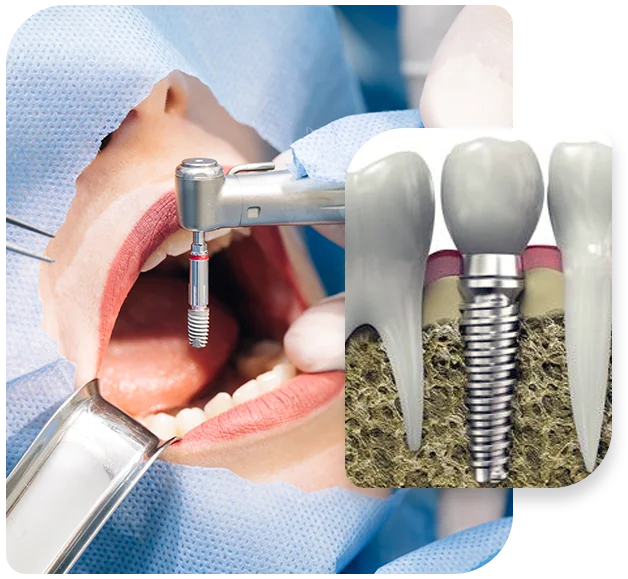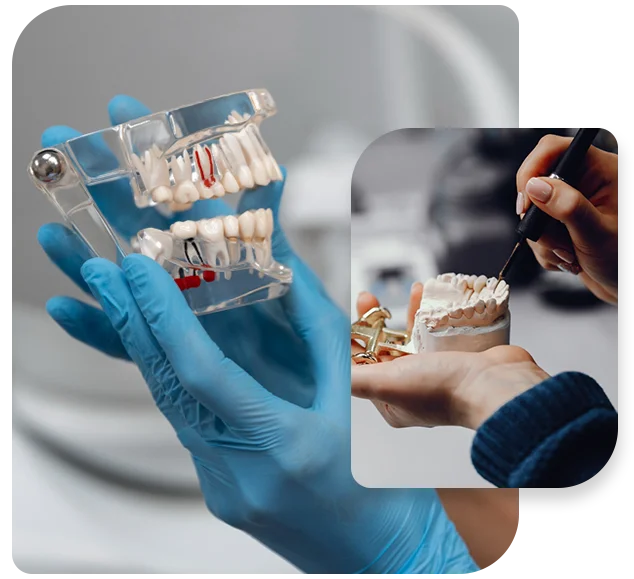Dental Implants
Transform Your Smile
Discover the Art and Science of Dental Implants
- Missing teeth
- Decayed/Non-restorable teeth
- Severely injured or traumatized teeth

What is a dental implant?
Precision and Expertise
Specialized Skills & Professional Care for Oral Surgery
The benefits of dental implants
Implants preserve the integrity of facial structures
By preventing the bone resorption that would normally occur with the loss of teeth, the jaw and facial structures remain intact. This is particularly important when all of the teeth are missing, as the lower one-third of the face collapses if implants are not placed to preserve the bone.
Your smile is improved
Your smile is improved when replacement teeth look more like natural teeth. Even when only one tooth is missing, long term esthetics are very good with an implant supported replacement tooth. This is particularly important in the front of your mouth, where preventing a visible bone defect is critical for natural appearance.
Replacing missing teeth with implant supported crowns/bridges does not involve the adjacent natural teeth, so they are not compromised, or damaged.
Overall quality of life is enhanced
Overall quality of life is enhanced with replacement teeth that look, feel and function like natural teeth. With implant supported replacement teeth, the appearance of the smile is more natural and the teeth function more like natural teeth. The result is increased comfort and confidence when smiling, speaking, and eating. If dentures and partials are replaced with implant supported teeth, the overall enhancement in quality of life is even more significant, with a new-found ability to eat all types of foods, eliminate messy adhesives, and improve speech, comfort and appearance.
Convenient Oral hygiene
Improved appearance
dental implant treatment plan
Preparing for Dental Implant Surgery
Dr. Patel will evaluate your remaining teeth and gums before dental implant surgery to make sure you are a good candidate for the procedure. If you are in good health, have healthy gums and adequate bone structure to support dental implants, he will develop a customized dental implant treatment plan for you.
If bone structure is inadequate but you meet other criteria for dental implant surgery, Dr. Patel may recommend bone grafting to improve bone support and facilitate dental implants.
In the weeks prior to dental implant surgery, Dr. Patel will provide you with specific pre- and post-operative care instructions. Smoking cessation will be necessary. You should also avoid consuming alcohol a week before your dental implant surgery.

Dental implant surgery
The Dental Implant Procedure
Dental implant surgery typically involves two surgical procedures, and local anesthesia is typically used for both procedures. The entire treatment process takes 4-6 months, and each surgical procedure may take an hour or more to perform. If multiple dental implants are placed, the time needed for surgery will increase.
The first dental implant procedure involves placing a small titanium post known as a tooth root implant in the bone socket of the tooth being replaced. This post will eventually anchor your new tooth to your gums. Under certain situations, Dr. Patel will coordinate with your dentist so that a temporary crown will be placed on your tooth root implant while you wait to complete the second phase of dental implant surgery.
Within 3-4 months
Healing from your first dental implant procedure should be complete, and the second stage of surgery may be performed. Dr. Patel will make a minimal incision to expose the implant. He will attach a small screw that will sit slightly above your gum tissue. After approximately 2 weeks of healing, you will follow up with your dentist who will complete the remaining portion of your treatment. Your dentist will fabricate the permanent crown, which will be attached to the implant.

